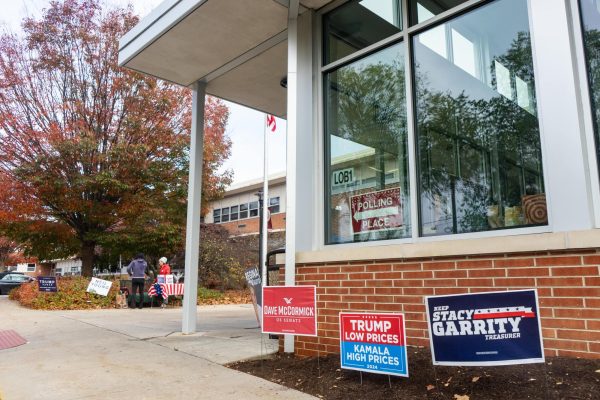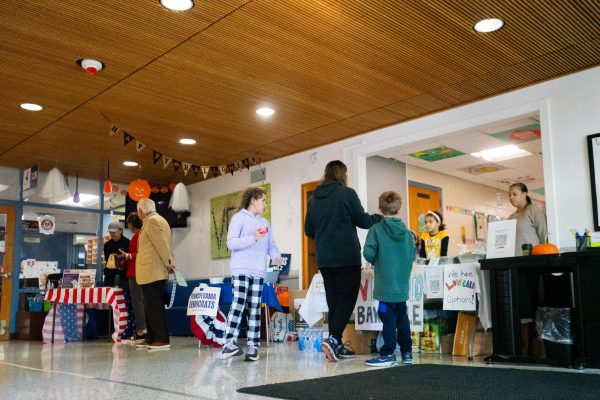Editor’s note: Young Republicans is currently not an active club at Conestoga.
As of Nov. 7, The Associated Press calls Republican candidate Donald Trump the winner of the 2024 presidential election with 295 electoral votes, defeating Democratic candidate Kamala Harris who earned 226. The day before, senior George Bové dropped off a mail-in ballot at a polling location for the election. He joined thousands of young voters across the country who cast a ballot for the first time.
“I feel like we can do a lot more change than we think we can, even us who are 18, 25; high schoolers and college students,” Bové said. “If I think back to 2020, I have opinions about the 2020 election — even the 2016 election. But with that, it’s like I couldn’t really do anything about it so it was kind of all kept to myself. But now that I have a voice here, there’s a lot that I’m opinionated about.”
Leading up to the election, various students, clubs and local organizations promoted youth political participation through volunteering for campaigns, posting on social media, arranging registration drives and conducting political polls. Starting in September, the Young Democrats club worked with the Pennsylvania Democratic Party to canvass Chester County. Sophomore and club member Sukanya Menon went door to door with other club members to contribute to causes she finds important.
“I’m not able to vote, but nonetheless, it’s still really important to be involved,” Menon said. “Advocating for others is something I’m really, really passionate about, and human rights is something I’m really passionate about. Even though I can’t vote, there are multiple other things I can do, and canvassing is one of them.”
Similarly, 2024 Pennsylvania Senate District 19 Republican candidate Duane Milne values youth civic engagement. Milne first became involved in politics through volunteering.
“It’s just great to see young people take an interest,” Milne said. “I started to be a volunteer for campaigns, and that is what got me interested and got me motivated to become part of the process. Even if it’s not something you do again, if nothing else, you will have much more awareness about politics and government.”
As a Judge of Elections in Tredyffrin Township, Carol Clarke is responsible for setting, staffing and running her designated polling location, Precinct 630. She recruits Conestoga students who are at least 17 years old to serve as student clerks on Election Day. In exchange for volunteer hours or payment, they are responsible for preparing and distributing ballots, writing in names, managing lines and helping voters as needed.
“I am so encouraged, and I feel so positive after meeting and working with the young students because they’re smart, they’re curious, they want to know more, they want to help, they want to do things, they want to make this world a better place,” Clarke said. “That just fills me with so much positive belief in the future of our country because they can make a difference.”
High school alumni establish independent initiatives, expand efforts

While this year’s election marked the beginning of some high schoolers’ political journeys, former students have continued to be involved through their own organizations.
In 2017, Jahnavi Rao founded New Voters as a club at Conestoga to engage high school students in the voting process. The organization has since grown into a national nonprofit focused on encouraging youth political participation, running nonpartisan voter registration drives and establishing branches in high schools across the country.
As a junior, Rao felt disappointed with the low voter turnout among eligible Conestoga seniors after the 2016 presidential election, which inspired her to start the club.
“My first thought was, ‘That’s so frustrating. I would have done anything to be able to vote, and you could and you didn’t,’” Rao said. “But I think my second reaction was that these people care about the election as much, if not more than I do. They care about the future of this country as much, if not more than I do. These are people who are posting things all over social media, and yet, they didn’t vote. So where is that disconnect? That’s what New Voters was created to address at a micro level at Conestoga.”
Since its creation, New Voters has worked with student leaders in 39 states. Through her work in the organization, Rao has found that youth-led initiatives are effective at increasing political engagement.
“I think that the biggest thing I’ve learned is that young people have so much capacity and inherent knowledge of many things, but especially how to mobilize their peers,” Rao said. “If you want to mobilize high school students to do something, high school students are the best people to do it because they have the tools, they have the understanding of their community, they have the connections, they have the language.”
A few miles away, 2024 Great Valley High School alumnus Lucca Ruggieri co-founded Patriot Polling as a junior after observing inconsistencies and problems with past election polls. According to its website, Patriot Polling is the first U.S. polling firm created by high schoolers. It has since expanded, now employing 10 analysts and conducting cold-call surveys to compile data.
Ruggieri also served as the manager for Republican Neil Young’s 2024 campaign for Pennsylvania’s 6th Congressional District. After hearing that his former middle school teacher was running for office, Ruggieri reached out with an offer to help and eventually became the campaign manager.
“I think if you really want to have an impact, the way to do it is to work within the system, so instead of organizing a protest, go and try to get involved in your local political party,” Ruggieri said. “Obviously, it’s not a bad thing to get involved in an issue that you’re passionate about, but I do think that working within the system is easier, and I think the results speak for themselves. You’re not really going to get anything done by standing around on a picket line, but you can if you have the ears of people with legitimate political influence.”
While developing Patriot Polling, Ruggieri faced criticism for being a younger figure in a field dominated by older and more established professionals.
“I got a lot of flak in the media for being young, a lot of personal attacks. What I learned is how to weather the storm,” Ruggieri said. “I think there are a lot of really sharp, hardworking young people who are out there and want to prove something and will do — maybe not just as good of a job — but even a better job than established political people.”
Social media fuels political discussion, youth react

Outside of official clubs and organizations, students have continued to be engaged in the election through the creation of and interaction with social media content. According to a 2024 study by Pew Research Center, 71% of U.S. adults ages 18 to 29 often or sometimes get news about local government and politics from social media, compared with 36% of those 65 and older.
During the 2024 presidential election, there was an emphasis on social media content, both created independently and by campaigns. Political advertisers spent more than $619 million on Facebook and Instagram advertisements, according to research jointly conducted by the Brennan Center, OpenSecrets and the Wesleyan Media Project. For the first time, the Republican and Democratic Parties invited roughly 100 and 200 social media influencers, respectively, to create content at their 2024 national conventions.
Senior Deekshitha Anandham, a Young Democrats and New Voters leader, emphasizes that political social media posts can encourage youth civic engagement.
“I think mostly they have been helpful because they’ve been advocating towards a younger audience,” Anandham said. “I feel like it’s a very creative way to campaign, and it’s been successful — millions of likes, millions of followers. In that way, I think it’s very good because it’s allowed the younger generations to be exposed to this kind of campaigning, political sphere and the candidates.”
As a U.S. government teacher, Blake Stabert has concerns about how online content can negatively affect users’ perception of politics.
“So much of what happens online is toxic and negative or manufactured in ways to make us feel certain ways. I don’t think it fosters a genuine desire to be a part of (politics),” Stabert said. “More often, it angers and riles us up and makes us disenchanted.”
As a new voter, Bové saw political content from social media platforms, such as TikTok and Instagram, leading up to the election. He said that it played a role in determining the party he would vote for and that it can both promote and discourage youth political engagement due to social media’s personalized algorithms.
“With social media, you’re able to create this shell of what you want to see. So if somebody isn’t particularly politically active — and it’s not an election season and it’s not a ton of political content going around — if they decide not to interact with that content, they’re not going to get it,” Bové said. “But with other people who are politically active, they’re going to get a lot more content that’s based around (their interactions).”
Tredyffrin Republicans outside poll observer Charles Randolph believes youth should prioritize voting over online discussion to be a part of significant change.
“It’s an important time in our country, and I think people are realizing that. That’s why they’re coming out to vote,” Randolph said. “More people (are) approaching young people to say, ‘Hey, have some skin in the game. Don’t just sit there and be a keyboard warrior, go out there. You have to vote.’”
Member of the Tredyffrin Township Democratic Committee Alan Yockey emphasizes that youth has been involved civically for decades.
“People would love to see the youth getting involved. I go back to the Vietnam War. We were protesting all over the place and were very involved in trying to influence national issues,” Yockey said. “The youth today has just as much chance to, and there’s a lot of reasons to get involved.”

Miya Cao can be reached at [email protected].
Lily Chen can be reached at [email protected].








